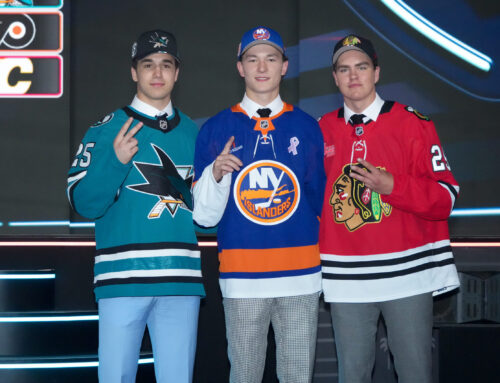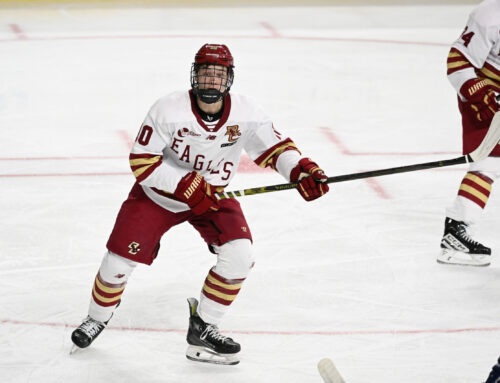
With players being hyped at younger and younger ages (see John Tavares), it's important to remember the ones that got away. Some players that look to be world beaters at 17 turn into fringe NHL'ers or AHL stars. How is a poolie to know a young stud from a young dud? An examination of Rob Schremp's career so far will help to shed some light onto why players don't live up to the hype.
On Canada Day in 2003, Schremp had the world at his feet. He had just turned 17 and with the rest of the summer ahead of him, was basking in the glow of an OHL Rookie-of-the-Year season. Schremp had lived up to the hype after being taken first overall at the 2002 Ontario Hockey League Priority Selection. Taken ahead of current NHL'ers Wojtek Wolski, Dave Bolland and Tyler Kennedy, Schremp's future appeared to be limitless. His 74 points were 17 ahead of rookie runner-up Wolski.
That season, Schremp finished second in Mississauga Ice Dogs' scoring behind another controversial American with similar size and talent. Patrick O'Sullivan, 18 months older, was battling serious domestic issues with his father and looked to be unravelling. How is it that six years later O'Sullivan has two solid NHL seasons under his belt and appears to have a solid NHL career, while some are debating whether Schremp can even play in the League?
If you Google "Robbie Schremp" the first entry you see comes from Wikipedia, the online Encyclopedia. After his birthdate and his draft status is the sentence, "He is well known for his 'lacrosse style' shootout deke." That's all Wikipedia has to say about him. Further Google results reveal links to his amazing hand-eye wizardry with captions such as "Ridiculous move" or "Amazing breakaway goal." The perception of Schremp as a wizard with the puck is accurate but damning, because not much else about Schremp's game stands out. To make matters worse, most of Schremp's visible successes have taken place on shootouts or breakaways. He's hockey's version of a Harlem Globetrotter. He's merely entertainment.
Schremp has had a hard time translating his puck wizardry into tangible professional results. He was clearly dominant at the OHL level. He even came back from a disheartening 25th overall selection in a weak 2004 draft to post an OHL leading 145-point season. But OHL success is sometimes hard to translate into pro success. Peter Sarno and Sheldon Keefe were dominant OHL players who were unable to take their game up a notch. Schremp's three-year AHL career indicates he's another Peter Sarno. He has averaged less than 60 points a season so far. For someone who turns 23 in two months, that's a far-cry from the NHL superstar status expected from him six years ago.
Aside from the media hype distorting Schremp's value, his character issues were always a warning sign for poolies. Schremp has been described as lazy, cocky and abrasive. Schremp swore repeatedly throughout his pre-draft interview with the Oilers and defended his actions by saying he was trying to be himself. He has had many run-ins with the media and is known for his healthy ego. Put that together with his attention-seeking, lacrosse-style moves and you have a clear indication that Schremp lacks character. Professional hockey has a way of weeding out players who lack character. In the NHL no matter how good you are, you have to pay the price sometime – you have to compete. Schremp doesn't have the character to compete and unless he wakes up fast, will never be an NHL star. There are just too many indicators otherwise.
Poolies should pay close attention to Schremp's story. The key to his lack of success is character. He didn't compete – or at least hasn't to this point. Players like Schremp, Sarno and Keefe can get by on talent in junior but don't have the level of competitiveness to get past the AHL. There are others like Darren Haydar Simon Gamache or Kris Beech who have the drive but lack the size, speed or talent. These players are easier to spot because they are less likely to be highly touted. The key words to look for when reading about prospects are character and competitiveness. If a prospect lacks either, then it's best to stay away. In the 2005 draft, Brian Burke took Bobby Ryan ahead of Jack Johnson based on the strength of Ryan's interview alone. Three years and a lot of patience later, the Ducks are reaping the rewards.




 FLA
FLA CHI
CHI NYR
NYR PIT
PIT L.A
L.A COL
COL N.J
N.J MTL
MTL CBJ
CBJ BOS
BOS DET
DET ANA
ANA
